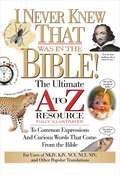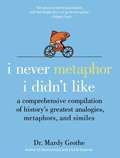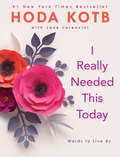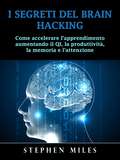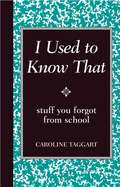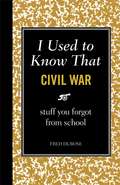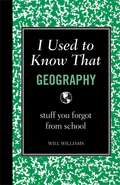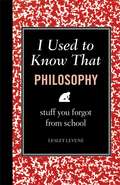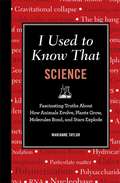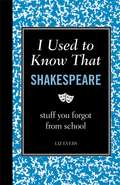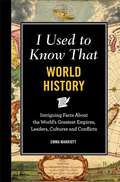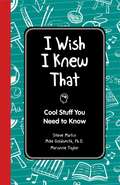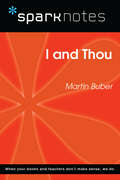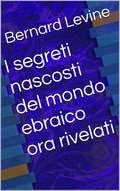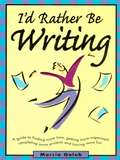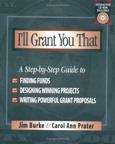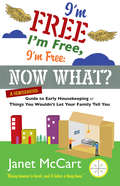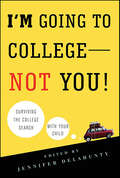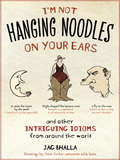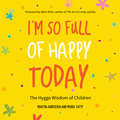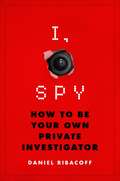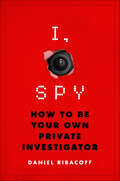- Table View
- List View
I Never Knew That Was in the Bible (A to Z Series)
by Martin ManserThe Ultimate A-to-Z Resource to Common Expressions and Curious Words from the Bible Martin Manser is a professional reference-book editor and Bible scholar who has compiled and edited more than 70 titles, including dictionaries and biblical reference works. He holds the BA Honours degree in linguistics and an M Phil degree, and he resides with his wife and children in England.
I Never Metaphor I Didn't Like
by Mardy GrotheThe murals in restaurants are on a par with the food in museums. America is an enormous frosted cupcake in the middle of millions of starving people. Critics are like pigs at the pastry cart. Describing something by relating it to another thing is the essence of metaphorical thought. It is one of the oldest activities of humankind-and one of the most impressive when done skillfully. Throughout history, many masters of metaphor have crafted observations that are so spectacular they have taken up a permanent residence in our minds. In I Never Metaphor I Didn't Like, quotation maven Dr. Mardy Grothe fixes his attention on the three superstars of figurative language-analogies, metaphors, and similes. The result is an extraordinary compilation of nearly 2,000 feats of association that will entertain, educate, and occasionally inspire quotation lovers everywhere. In this intellectual smorgasbord, the author of Oxymoronica and Viva la Repartee explains figurative language in a refreshingly down-to-earth way before taking readers on a tour of history's greatest word pictures. In chapters on wit, love, sex, stage and screen, insults, politics, sports, and more, you will find quotations from Aristotle and Maya Angelou to George Washington and Oprah Winfrey.
I Never Metaphor I Didn't Like: A Comprehensive Compilation of History’s Greatest Analogies, Metaphors, and Similes
by Dr Mardy GrotheThe murals in restaurants are on a par with the food in museums.America is an enormous frosted cupcake in the middle of millions of starving people.Critics are like pigs at the pastry cart.Describing something by relating it to another thing is the essence of metaphorical thought. It is one of the oldest activities of humankind--and one of the most impressive when done skillfully. Throughout history, many masters of metaphor have crafted observations that are so spectacular they have taken up a permanent residence in our minds. In I Never Metaphor I Didn't Like, quotation maven Dr. Mardy Grothe fixes his attention on the three superstars of figurative language--analogies, metaphors, and similes. The result is an extraordinary compilation of nearly 2,000 feats of association that will entertain, educate, and occasionally inspire quotation lovers everywhere.In this intellectual smorgasbord, the author of Oxymoronica and Viva la Repartee explains figurative language in a refreshingly down-to-earth way before taking readers on a tour of history's greatest word pictures. In chapters on wit, love, sex, stage and screen, insults, politics, sports, and more, you will find quotations from Aristotle and Maya Angelou to George Washington and Oprah Winfrey.
I Really Needed This Today: Words to Live By
by Hoda KotbFrom New York Times bestselling author and beloved Today show co-host Hoda Kotb comes an inspiring collection of quotes--drawn from her own personal favorites featured on her enormously popular Instagram account--that offer wisdom, courage, and hope.Several years ago, Today show co-host Hoda Kotb began posting a variety of quotes on her Instagram page. Some were penned by a favorite writer; others offered a dose of love or laughter. She thought the quotes were meaningful only to her, but soon a funny thing started happening - reactions poured in from thousands of people who were just as moved. The quotes weren't only providing inspiration to Hoda, they were comforting and connecting people. So many of their comments read, "I really needed this today," a phrase that inspired the book's title. In I Really Needed This Today, Hoda not only shares 365 sayings and quotes, she writes about the people and experiences that have pushed her to challenge boundaries, embrace change, and explore relationships to their fullest. Written with her signature wit and warmth, this book is the ideal companion to tuck beside your bed or to bring with you on-the-go to keep you motivated, recharged, and inspired each day.
I Segreti del Brain Hacking: Come accelerare l'apprendimento aumentando il QI, la produttività, la memoria e l'attenzione
by Stephen MilesI segreti che usano gli esperti per migliorare le prestazioni del loro cervello! Grazie a strategie collaudate da decenni, questo e-book ti guiderà attraverso le teniche più veloci e più efficaci per migliorare la tua memoria. Imparerai come aumentare le tue capacità cognitive e dare una spinta al tuo QI in poche ore ma non solo: imparerai ad essere più concentrato, a ottenere maggiori risultati e sentirai di avere più energia che mai. Vuoi sapere come fanno i migliori al mondo a mantenere sempre così alti i livelli della loro performance? Anche se sei una persona nella media, puoi imparare i segreti per ottenere anche tu performance di questo tipo. Questa guida ti insegna anche alcune tecniche collaudate per migliorare la memoria. La guida comprende: - Un programma di allenamento efficiente e veloce. - Come aumentare la produttività. - Come aumentare la memoria. - Come aumentare la concentrazione. - Come aumentare l'intelligenza in generale. E MOLTO ALTRO! Se vuoi allenare il tuo cervello nel miglior modo possibile, questo è il libro che fa per te. -> Vai in cima alla pagina e fai clic su aggiungi al carrello per acquistarla immediatamente Disclaimer - Dichiarazione di esclusione di responsabilità L'autore, il traduttore, l'editore e / o i titolari dei diritti non accettano reclami, non rilasciano promesse o garanzie in merito all'accuratezza, alla completezza o all'adeguatezza dei contenuti di questo libro e declinano espressamente la responsabilità per errori o omissioni nei contenuti. Questo prodotto è solo per riferimento. Si prega di consultare un professionista prima di utilizzare uno qualsiasi dei contenuti trovati all'interno.
I Used to Know That
by Caroline TaggartThis small but mighty collection will trigger your memory with fun facts you learned in school-from adverbs to the Pythagorean Theorem. Witty, engaging, entertaining-a book you'll pick up again and again. Author Caroline Taggart discovered two things while researching this book and talking with other people: One, everybody had been to school. And two, they had all forgotten entirely different things. Contained in this handy little book are the facts that you learned in school, but may not remember completely or accurately. Covering a variety of subjects, this book features all the most important theories, equations, phrases, and rules we were all taught years ago. Rediscover: * History: The first president to occupy the White House was John Adams in 1800 * Religion: The seven deadly sins and the names of the twelve apostles * Literature: In which Shakespearean play "The quality of mercy" speech appears * Science: The periodic table of elements devised by a Russian chemist in 1889 includes the symbol for lead (Pb), silver (Ag), tin (Sn), and gold (Au) * Nature: How photosynthesis works The information-presented in easy-to-retain, bite-sized chunks-is accurate and up-to- date. It will touch a chord with anyone old enough to have forgotten half of what they learned at school. Here is a perfect gift for every perennial student.
I Used to Know That: Civil War
by Fred DuboseAs the 150th anniversary of the Civil War approaches, the fascination with all things Civil War continues ever more strongly. With I Used to Know That: Civil War, snippets of history class will come rushing back as you recall that: The mere election of Abraham Lincoln pushed seven Southern states to secede. Distinguished soldier and military strategist Robert E. Lee was offered command of the U.S. Army two days before he was chosen to lead the rebel army of Northern Virginia. Elizabeth Van Lew, a wealthy spinster who lived in the Confederate capital, feigned craziness to mask her activities as one of the Union's most effective spies. Robert Smalls, a slave, absconded with a Confederate ship, went on to pilot ships for the Union Navy, and was elected to the U.S. House of Representatives after the war. Author Fred DuBose takes you beyond the history book and in a lively style brings to life colorful stories that include heroes, brilliant military strategists, blunderers, spies, wives on the home front, Underground Railroad facilitators, surgeons, and journalists who took the highs and lows of the war to the public.
I Used to Know That: Geography
by Will WilliamsDo you know which countries border Afghanistan? Or the difference between Micronesia and Melanesia? And that 51 member states existed in 1945 at the founding of the UN and 192 exist today? It's hard to know everything about geography, that amazing science that explains the interaction of diverse physical, biological, and cultural features of the Earth's surface. However, I Used to Know That: Geography explores both the physical and human aspects of the world in short order. With its entertaining, easy-to-understand language, this little book takes on a broad subject with ease. Inside you'll find: The physical world: rivers & coasts, tectonics, climate and weather, global issues The human world: world population growth, settlements and how they happened, industry and energy, and development Countries by continent maps, complete with capital cities and population counts Maps and a "tree" illustration, showing all branches of geographyWith its "a-ha!" facts, useful illustrations, and interesting sidebars, I Used to Know That: Geography offers answers to common geography questions and gives you all you need to know to start a provocative conversation at your next party.
I Used to Know That: Philosophy
by Lesley Levene"All are lunatics, but he who can analyze his delusions is called a philosopher." -Ambrose Bierce, EpigramsIf a tree falls and no one hears it, does it make a sound? I Used to Know That: Philosophy examines this and many other related questions. Spanning over some two-and-a-half thousand years of philosophical thought, this book covers the main highlights, from Pythagoras and Heraclitus, to Socrates, Plato, and Aristotle, to Descartes, Kierkegaard, Marx, and Sartre. From the Socratic method to structuralism, you'll get an overview of all the major theories, presented in an easy-to-understand and engaging format. This lively, fun-to-read compendium explains how philosophy began and uncovers the thinkers and movements that have used it in both brilliant and frightening ways. It includes: Short biographies of all the great philosophers, from the early Greeks to the modern greats All the main -isms and -ologies, from atomism to utilitarianism, via epistemology and ontology Quips, quotes, and conundrums to impress your friends at your next dinner partySo if you ever paused to wonder about the origin of the phrase "platonic love" or why Nietzsche came to believe that "God is dead," this is the book for you. It will refresh and enlighten you, and it may even make you stop and reflect on the larger questions of life. Because after all, as Socrates said, "the unexamined life is not worth living."
I Used to Know That: Science
by Marianne TaylorDo you know why we are able to see light and hear sound? What is the Earth made of? How does the body produce energy? And, most important, does any of this matter? In I Used to Know That: Science, Marianne Taylor will answer those questions and more and will tell you why the answers are vital to us and to the scientists working on the cutting edge of scientific research. In this book, you will learn about: Physics-Energy and Electricity: How electricity is generated; how heat moves from one place to another; the relationship between electricity and magnetismForces: The four fundamental forces; the origins of the universe; the composition and behavior of planets, stars and galaxies; the basic laws of mechanical physicsWaves, Radiation and Space: How waves behave and how they affect us; the electromagnetic spectrum; radioactivity Chemistry-The Periodic Table: How to read the table; how atoms work; chemical bonds and reactionsFuels, Air and Pollution: Chemicals, both helpful and dangerous, in the air; crude oil and its useful chemicals; live cycle assessmentsMetals: The Earth's structure; metals and alloys; construction materialsOrganic Chemistry: Natural polymers and their usefulness; nutrition; which chemicals are harmful Biology-Human (and Other) Bodies: The body's systems-circulatory, skeletal, muscular, nervous, digestive, reproductive, respiratory and sensoryCell Biology: The structure of a cell; how photosynthesis works; what hormones doEvolution and Environment Ecology: The origins of life; how the eukaryotic cell evolved; mutation and natural selection; population, predation and extinctionGenetics: what chromosomes are; how you inherit genetic traits
I Used to Know That: Shakespeare
by Liz EversCapturing the unbelievable scope of Shakespeare's influence, this book covers the little-known details of Shakespeare's life along with the surprising legacy of the language and phrases inherited from his works. Organized for easy reference, sections include: Shakespeare's Life Who was this man--the playwright, the lover, the family man? Words and Phrases Owed to Shakespeare Did you know we have Shakespeare to thank for words such as "bandit," "fashionable," and "moonbeam" and the phrases "in my mind's eye," "in my heart of hearts," and "to thine own self be true"? His Theater and Plays Synopses of the most famous of his plays Character Glossary All the most memorable, infamous, and beloved characters from Shakespeare's collective works, including Beatrice, Julius Caesar, Ariel, Falstaff, Cleopatra, Othello, and Horatio Index of Famous Lines "Better a witty fool than a foolish wit" from Twelfth Night and "Tempt not a desperate man" from Romeo and Juliet Whether you're planning an appearance on Jeopardy or simply want to become a more interesting conversationalist, I Used to Know That: Shakespeare will provide you with hours of entertainment.
I Used to Know That: World History
by Emma MarriottIt can be difficult to keep different historical events and figures straight in your head, which is why I Used to Know That: World History presents major episodes in history with short, easily understood sections. Among the people, movements, and events covered are: · Ancient Greece and Rome-Learn about the birth of democracy and the death of the Roman Republic· The Middle Ages-From the Crusades to the Hundred Years War and the signing of the Magna Carta to the Black Plague· The Renaissance-A cultural revival that changed art, poetry, learning, and religion forever· The Revolutionary War-How America became independent; George Washington, the "father of the nation"· The Age of Empire-European colonialism in Africa and Asia; American expansion and the Civil War· Wars of the 20th Century-World War I and World War II; Hitler, Stalin, Churchill, and Roosevelt; the Cold War; the rise and fall of fascism and communism Packed with important facts and sweeping overviews of historical events, I Used to Know That: World History is essential reading for anyone who wants to understand the history of civilization and the geopolitical situation of today.
I Wish I Knew That: Cool Stuff You Need to Know
by Steve Martin Marianne Taylor Dr Mike GoldsmithAn Apple a Day Keeps the Low Marks Away!<P><P> Have you ever been excited to find out you knew something the other kids in your class didn't? Then just think about how you would feel if you knew hundreds of fascinating tidbits-on everything from art, literature, and history to geography, science, and math-from just one quick-and-easy read crammed with fun and cool stuff you shouldn't have to wait to find out about. With I Wish I Knew That you will speed through science, whiz through history, and take a dip into the classic Greek and Roman myths in no time at all. Inside, learn all about... <P>* Classic Reads: A guide to classic children's literature such as Call of The Wild, Anne of Green Gables, The Wind in The Willows, Little Women and Shakespeare. <P>* How Land is Shaped and Changed: Erosion, Glaciers, Volcanoes and the world's tallest mountain, largest sea, and longest river. <P>* Math Stuff: Jump Into Geometry by learning that the three points of a triangle, whose angles always add up to 180º make measuring more precise. <P>* Science at a Glance: The Periodic table which was invented by Dmitri Mendeleyev and beginners' Biology <P>* History Stuff: Early explorers, important wars, all the Presidents and British Kings and Queens as well as the names of the countries and their capital cities. <P>* Bonus sections include Poet's Corner, Brief History of Music, The World Of Art and Geological Time, In Brief <P>With I Wish I Knew That you'll boost your general knowledge and jump to the head of the class!
I and Thou (SparkNotes Philosophy Guide)
by SparkNotesI and Thou (SparkNotes Philosophy Guide) Making the reading experience fun! SparkNotes Philosophy Guides are one-stop guides to the great works of philosophy–masterpieces that stand at the foundations of Western thought. Inside each Philosophy Guide you&’ll find insightful overviews of great philosophical works of the Western world.
I segreti nascosti del mondo ebraico ora rivelati
by Stefano Vazzola Bernard LevineL'avete chiesto e a furor di popolo ecco qui altri segreti della vita e degli usi degli ebrei. Cosa fanno gli ebrei a casa ogni giorno? Cosa mangiano? Come rispettano lo Sabbath? Quali sono le festività ebraiche e molto altro ancora! Troverete cose illuminanti e vi divertirete molto mentre scoprite i segreti nascosti di ciò che accade nel mondo ebraico.
I'd Rather Be Writing: A Guide to Finding More Time, Getting Organized, Completing More Projects and Having Fun
by Marcia GolubA published novelist and editor offers advice and cheery companionship through the processes associated with professional writing: finding time, dealing with insurmountable obstacles, getting organized, and completing projects. Annotation copyrighted by Book News, Inc. , Portland, OR
I'll Grant You That: A Step-by-Step Guide to Finding Funds, Designing Winning Projects, and Writing Powerful Grant Proposals
by Jim Burke Carol Ann PraterI'll Grant You That is an all-in-one resource for finding funds, designing winning projects, and writing powerful proposals.
I'm Free, I'm Free, I'm Free: A Semiserious Guide to Early Housekeeping, or Things You Wouldn't Let Your Family Tell You
by Janet MccartIf you've just graduated, or if you haven't--if you're going to advanced school, or if you aren't--if you're setting things in motion to strike out on your own--or if you blew the first or second go at liberty and having your own living space--you're in the right place. If you are serious about rules and guidelines and closets and all the details, go see Martha. If you'd prefer some easy-going, mildly cynical guidance, I'm Free, I'm Free, I'm Free: Now What? is for you. Align the Law of 'what goes up must come down' with the Golden Rule. Now add beds, moving, bills, friends, food poisoning, cleaning, toilets, money, rentals, baseline manners, and roommates, and you have a pretty good idea where we're going here. The bottom line of I'm Free, I'm Free, I'm Free: Now What? is to help you become sort-of informed so that you decide, and whatever happens, it's your fault.
I'm Going to College—Not You!: Surviving the College Search with Your Child
by Jennifer DelahuntyAcceptance by a top college is more than a gold star on a high school graduate's forehead today. It has morphed into the ultimate "good parenting" stamp of approval--the better the bumper sticker, the better the parent, right? Parents of juniors and seniors in high school fret over SAT scores and essays, obsessed with getting their kids into the right college, while their children push for independence. I'm Going to College---Not You! is a resource for parents, written by parents who've been in their shoes. Kenyon College dean Jennifer Delahunty shares her unique perspective (and her daughter's) on one of the toughest periods of parenting, and has assembled a top-notch group of writers that includes best-selling authors, college professors and admissions directors, and journalists. Their experiences with the difficult balancing act between control freak and resource answer questions like:--how can a parent be less of a "helicopter" (hovering) and more of a "booster rocket" (uplifting)?--what do you do when your child wants to put off college to become a rock star? and--how will you keep from wanting to kill each other?Contributors include: Jane Hamilton David LattNeal Pollack Joe QueenanAnne Roark Debra Shaver Anna Quindlen Ellen Waterston
I'm Not Hanging Noodles on Your Ears and Other Intriguing Idioms From Around the
by Bhalla JagI'm not hanging noodles on your ears. In Moscow, this curious, engagingly colourful assertion is common parlance, but unless you're Russian your reaction is probably "Say what?" The same idea in English is equally odd: "I'm not pulling your leg." Both mean: Believe me. As author Jag Bhalla demonstrates, these amusing, often hilarious phrases provide a unique perspective on how different cultures perceive and describe the world. Organized by theme - food, love, romance, and many more - they embody cultural traditions and attitudes, capture linguistic nuance, and shed fascinating light on "the whole ball of wax." For example, when English-speakers are hard at work, we have our "nose to the grindstone," but industrious Chinese toil "with liver and brains spilled on the ground" and busy Indians have "no time to die." This surprising, often thought-provoking little tome is gift-friendly in appearance, a perfect impulse buy for word lovers, travelers, and anyone else who enjoys looking at life in a riotous, unusual way. And we're not hanging noodles from your ear.
I'm Not Hanging Noodles on Your Ears and Other Intriguing Idioms From Around the World
by Jag Bhalla"I'm not hanging noodles on your ears." In Moscow, this curious, engagingly colorful assertion is common parlance, but unless you're Russian your reaction is probably "Say what?" The same idea in English is equally odd: "I'm not pulling your leg." Both mean: Believe me.As author Jag Bhalla demonstrates, these amusing, often hilarious phrases provide a unique perspective on how different cultures perceive and describe the world. Organized by theme--food, love, romance, and many more--they embody cultural traditions and attitudes, capture linguistic nuance, and shed fascinating light on "the whole ball of wax." For example, when English-speakers are hard at work, we're "nose to the grindstone," but industrious Chinese toil "with liver and brains spilled on the ground" and busy Indians have "no time to die."If you're already fluent in 10 languages, you probably won't need this book, but you'll "get a kick out of it" anyhow; for the rest of us, it's a must. Either way, this surprising, often thought-provoking little tome is gift-friendly in appearance, a perfect impulse buy for word lovers, travelers, and anyone else who enjoys looking at life in a riotous, unusual way. And we're not hanging noodles from your ear.
I'm Not Hanging Noodles on Your Ears and Other Intriguing Idioms from Around the World
by Jag Bhalla"I'm not hanging noodles on your ears." In Moscow, this curious, engagingly colorful assertion is common parlance, but unless you're Russian your reaction is probably "Say what?" The same idea in English is equally odd: "I'm not pulling your leg." Both mean: Believe me. As author Jag Bhalla demonstrates, these amusing, often hilarious phrases provide a unique perspective on how different cultures perceive and describe the world. Organized by theme--food, love, romance, and many more--they embody cultural traditions and attitudes, capture linguistic nuance, and shed fascinating light on "the whole ball of wax." For example, when English-speakers are hard at work, we're "nose to the grindstone," but industrious Chinese toil "with liver and brains spilled on the ground" and busy Indians have "no time to die." If you're already fluent in 10 languages, you probably won't need this book, but you'll "get a kick out of it" anyhow; for the rest of us, it's a must. Either way, this surprising, often thought-provoking little tome is gift-friendly in appearance, a perfect impulse buy for word lovers, travelers, and anyone else who enjoys looking at life in a riotous, unusual way. And we're not hanging noodles from your ear.
I'm So Full of Happy Today: The Hygge Wisdom of Children
by Martin Andersen Mora TuffyFinalist Pacific Book Awards 2018! A celebration of one of the most simple joys in life: the unwitting comedy of children. Is there anything more likely to make you laugh and put a smile on your face than the innocent and funny remark of a child? Ever since Art Linkletter first published Kids Say the Darndest Things in 1957, people have laughed and been delighted with the things kids say. The Danes have a word for the feeling of happy delight that you get from simple things in life: &“hygge.&” In I&’m So Full of Happy Today: The Hygge Wisdom of Children you will explore many of the hilarious things kids say in our world today, like these quotes: Dylan, age 5, &“Mom, did it hurt much when you gave birth to Daddy?&”Keira, age 8, &“Being in love is like having a birthday in your stomach.&”Miley, age 3, &“When I grow up, I want to be pregnant. Or a princess.&”Jack, age 5, &“Mom, how old were you when you were my age?&” The latest in funny kids books: I&’m So Full of Happy Today is a heartwarming collection of the remarkably observant, funny, and wise things said by children, aged two to ten years. All of the stories have a very real and personal feel, and include the name and age of each child. These playful, sometimes &“tongue-in-cheek&” tales straight from the minds and mouths of kids will have you learning and laughing long after you&’ve turned the last page. You will be hygge happy!
I, Spy: How to Be Your Own Private Investigator
by Daniel Ribacoff<P><P>The do's and don'ts of surveillance <P><P>How to conduct a stakeout--from what to wear to what to bring <P><P>How to track down anyone anywhere <P><P>How to collect and interpret evidence <P><P>How to tell if someone is lying <P>How to utilize informants <P>How to protect your home, your valuables, and your privacy <P>How to go off-grid, for now or forever <P>How to know if you're being stalked <P>The fundamentals of garbage retrieval.
I, Spy: How to Be Your Own Private Investigator
by Daniel RibacoffHave you ever wanted to be your own private eye? Have you ever wanted to track down long-lost relatives or people who've scammed you? Have you ever wanted to know if your kids really are where they say they are? Or if your significant other is cheating on you? Or how to locate assets in order to collect on a judgment?In I, Spy, world-renowned private investigator Dan Ribacoff will show you how. With decades of experience in public safety, private investigation, and credibility assessment, Dan will teach you: The do's and don'ts of surveillanceHow to conduct a stakeout--from what to wear to what to bringHow to track down anyone anywhereHow to collect and interpret evidenceHow to tell if someone is lyingHow to utilize informantsHow to protect your home, your valuables, and your privacyHow to go off-grid, for now or foreverHow to know if you're being stalkedThe fundamentals of garbage retrievalAnd much, much more!Learn the art of private investigation from a pro. With Dan's time-tested tips and stories of true crime detection--straight from the gritty streets of New York City--you'll be hot on the trail in no time!
